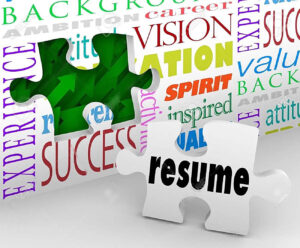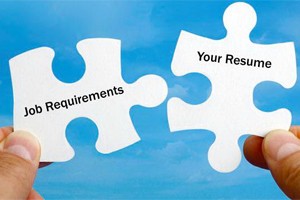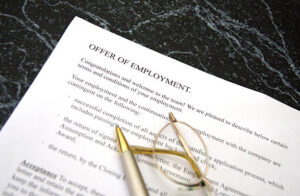Your resume won’t get you a job
It’s astonishing to see how many candidates believe their resume is the most important or deciding factor in their job search process. Each week I’m contacted by people who are thinking of making a change, and their first question is “can you help me with my resume?” and the next is “what will it cost?” When I ask for context, e.g., who will be reading it or which position they’re pursuing, the response is frequently “I don’t know.” Clearly there is a misconception about what the resume will do. One thing you need to know for certain: your resume won’t get you a job.
There’s more to capturing rewarding work than creating “the perfect resume”.
Your resume isn’t the beginning of the process, nor is it the end. It’s certainly a piece of the puzzle, but there’s much more to capturing rewarding work than creating “the perfect resume.” It can’t decide for you what you want to do and it can’t make you qualified for something you are not. Even if your resume catches an employer’s attention, the outcome of the interview will be the deciding factor in determining whether you get the offer. Therefore, it’s critical to integrate preparation for the interview into the resume-building process and not assume the resume will work on its own.
Your resume will be an ongoing project. It will continue to evolve as you determine your interests and target specific roles. Pulling all of your experience together into a “master” document is a great start for preparing for a job change. But no one should see your master. It’s for your records and will serve as a holding place for all of your employment history. The real work comes into play after a specific target has been determined and you have learned what the unpublished needs/viewpoints/preferences of the employer are. When you have identified your audience and you fully understand the context around their needs, you can then tailor your resume.
Your resume needs to speak to the role you’re pursuing.
Unless you have done only one thing, the same way, with the same results throughout your career and are choosing to stay in the same lane, one resume does not fit all applications. If you’re making a career change, then your resume needs to speak to the role you’re pursuing vs. what you’re leaving behind. Your resume should illustrate how your experience matches their need and also corresponds with how their sector or culture operates. This information may not be included on a job announcement as a requirement, but it may be a significant piece of why you will or will not be considered.
It’s essential to focus on information that is relevant to the role/employer you are targeting. Excess information distracts the reader from seeing your value for the particular position and/or need and might lead them to making inaccurate assumptions. Titles that suggest you might be “overqualified” or “too expensive,” or context that implies you had more responsibility than the current role requires, can cause an employer to move past you entirely.
The buck will stop with the hiring manager.
Thinking the resume will get you the job can lead to another common mistake. It’s typical for candidates to include skills on their resumes that they’re unable to support when asked for a description of their work. Using this approach sets you up to fail. A big problem occurs when you intentionally apply using phony skills or “key words”. A few simple questions around the context of your experience will expose how unsuited you are for the role. Questions missed in a screening interview can surface in the next stage of interviewing. So even though adding key words to your resume will get attention, the buck will stop with the hiring manager. They will expect you to offer examples and they know what to listen for. The inability to back up a claim or show evidence of what you’ve done that fits their specific needs will prevent you from receiving an offer.
Don’t assume you only needed to get in the door.
Sourcing candidates with the right skills via a resume database is often the first step in the recruitment process. But the skills still need to be vetted or proven. The use of “fluff”, exaggeration and unqualified results can also get you into trouble. If the initial screener has limited understanding of the role they are trying to fill, they may make assumptions that are not true. Screeners may be impressed with fancy words or vague claims and send you through, only to have the door shut on you later in the process. Don’t assume you only needed to get in the door and you can “wing it” once you get to the interview. Taking this approach can turn into an embarrassing situation or end up burning bridges. No matter how attractive or clever it is, a resume cannot speak for you in an interview.
Research the employer prior to applying.
It’s critical to research the employer prior to submitting an application to learn more about their needs. Knowing more about them in advance allows you to tailor your resume for each situation. Tailoring your resume to fit the needs of the employer (which may be different from, or more than, what has been publicly posted) is actually the beginning of the interview preparation process. It helps you to focus on the skills and employment experiences that are most relevant to the people you’ll be interviewing with. When you have included the right information, it’s much easier to begin composing answers to potential interview questions by linking them to your relevant work experience. This investment actually serves you more than it may serve the employer.
By the time you’re ready to submit your resume you will have:
- Clarity about what you want and need.
- Researched the market and understand your competitive position.
- Identified why you want to work for each of your targeted employers.
- Know what you have to offer that they need.
- Prepared answers to the questions any employer is most likely to ask.
Your resume doesn’t get you the job- it starts the conversation.
If you have done your homework well, your resume should trigger a response. You must expect to get an email or a call. Be ready! Tailor your answers to the most commonly asked interview questions to this employer’s specific situation. Remember: your resume doesn’t get you the job- it starts the conversation.
When you receive the invitation to interview, get as much information as you can from them. Make sure to ask who you’ll be meeting with, then research them to get a sense of what their backgrounds are. Look for clues that might shed light on what might be important to them or how their experience may frame their view about the kind of person they would hire for the role they are filling.
Failing to prepare for an interview can turn into a colossal waste of time.
Failing to prepare for an interview can turn into a colossal waste of time. It can lead to disappointment and even sever relationships. Misrepresentation can cause real problems for you and for the person who referred you. Making a misstep in an interview can prevent you from moving forward with any other positions with the same employer. Or, if a recruiter’s/hiring manager’s questions reveal a personality flaw or contradiction while interviewing with one company, and the recruiter/hiring manager moves to another, you can become unofficially blacklisted. Any way you look at it, not preparing for an interview can turn out badly for everyone.
Your resume only gets an employer’s attention. You have to keep it. Understanding how companies operate and what is important to them will help you select employers that make sense. Completely understanding your competitive position will allow you to select the right roles to pursue. Once this information is determined, then creating a resume that captures their attention is important. But what is more important is to make sure you plan the time to prepare for every interview so you can present your best case for winning the offer.
For more career advice, check out my Unbeatable Interviewing Techniques, Career Assessment and Goal Setting webinars and follow me on LinkedIn and Twitter.












